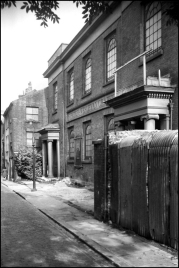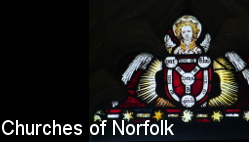| |
|
St
Peter's Park Lane Methodist, Norwich My friend Sarah had
arranged to show me the former Swedenborgian Chapel in
Norwich, which is not far from her house, and is owned by
people she knows. On the way, we passed this big suburban
Methodist church of the 1930s. She had assumed I had
already known about it, but the suburbs of any city can
be full of surprises. It was locked, of course, because
there is no liturgical reason why a Methodist church
should be open outside of service times, but the board on
the wall suggested that this was a busy place, with lots
going on.
I pressed
my face against the glass entrance doors to see inside,
and this was when I got my really big surprise. There, at
the far end, above the holy table and the dias, was a
huge window which was instantly recognisable as being by
either Christopher Webb or his pupil Francis Skeat - on
reflection, I incline towards the latter.
St Peter
is one of many Methodist churches built in England in the
years just before and after the Second World War. The
three main streams of Methodism came together to form a
single denomination in 1932, and, as Methodist communites
combined and settled together, they found they had a
surplus of buildings on their hands. However, the new
Methodism also gave them the confidence to focus their
resources where they were needed, and it was a
combination of these two trends which led to this chapel
being built here, just off the Earlham Road. The
community had started in Lady Lane in St Peter Mancroft
parish, now somewhere under the Forum, where a Wesleyan
chapel was opened in 1824. It was known as St Peter's
Wesleyan Chapel from the name of the parish. By the end
of the century, the increasing profile of Wesleyanism in
what is, above all others in England, a non-conformist
city, gave it the confidence and energy to open a
daughter chapel out in the western suburbs. Park Lane
Wesleyan Methodist Church opened in 1894, and soon
developed into a separate community of its own.
 a.jpg)
By the 1930s, even before the destruction
wreaked on the city by German bombs, it became clear that
the Norwich Corporation was about to undertake a massive
redevelopment of the area to the west of the Market
Place. They began buying up parcels of land, including
the Lady Lane chapel school, and as the St Peter Mancroft
parish rapidly depopulated it began to make sense to
bring the two churches back together, and build a large
new church on a new site somewhere. It became possible to
do this on the empty land immediately to the west of Park
Lane chapel, and so in September 1939 this fine building
was opened, combining the names of St Peter's Chapel and
Park Lane Church. It was built to the designs of the
architect Cecil Yelf, himself a Norwich Methodist. The
Lady Lane chapel was eventually demolished in the 1950s
in preparation for the the building of Norwich's
ill-fated central library. The original Park Lane church
continued in use as a church hall, to be largely rebuilt
in the 1960s.
| A
curious legend has grown up about the opening of
this church, which I heard quite separately from
several different sources. The first day of the
Second World War, 3rd September 1939, was a
Sunday, and Prime Minister Neville Chamberlain
announced that Britain was at war with Germany at
midday. By coincidence, I heard, this was the
opening day of St Peter's Park Lane, and the
congregation had gone into the opening service at
eleven o'clock with Britain at peace, only to
come out again at half past twelve to find it at
war. It seemed an exciting, if slightly
inauspicious start, and a good story. Slightly
disappointingly, I found it was not exactly true:
in fact, the building was opened and dedicated
four days later, on the evening of the 7th of
December. But certainly the outbreak of war
overshadowed the excitement of that new
beginning. And the window? I have been
unable so far to find out anything about it. This
chapel has an excellently documented history, but
nobody at the church now seems to know who the
glass was made by. It does not appear on the
lists of major works by either Webb or Skeat, and
yet I am sure that it must be by one or the
other, and as I say, I incline towards Skeat. It
depicts Christ in Majesty flanked by St Peter and
St John. Below is the Lamb of God, and beneath
that a typical Skeat scene of Christ meeting the
Disciples on the shores of Lake Galillee. It is
magnificent, and deserves to be far better known.
Another
good story about St Peter's Park Lane is
recounted in A Church for All Seasons by
Joan and Jim Beckett, a little book about the
Church published in 1975. One of the congregation
in the 1950s was Lord Mackintosh, the millionaire
owner of Norwich's largest chocolate factory. He
was also charged with the responsibility under
the Conservative government of Harold Macmillan
of overseeing the introduction of Premium Bonds
in 1956, which many Methodists frowned on as a
form of gambling. The minister of St Peter's at
the time got up a petition against the bonds.
Mackintosh later recalled in his autobiography
that, on shaking hands with the minister in the
porch after a Sunday service, he had smiled wrily
and said "I'm sorry that I won't be able to
sign your petition". Mackintosh noted that
the minister smiled too, and I had a sudden
moving feeling that England was the best of all
countries to live in.
|
|
 |
|
|
|
